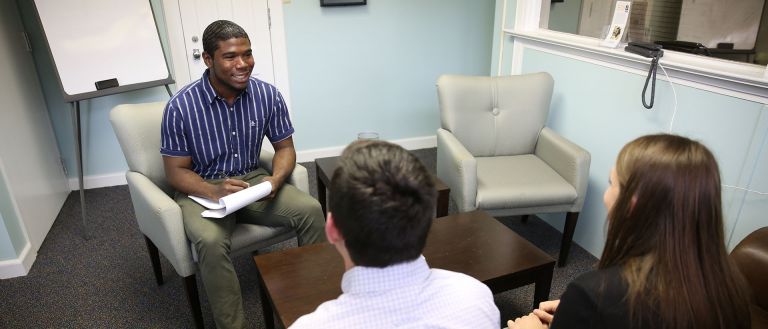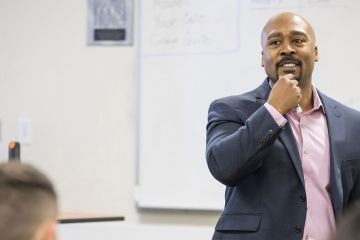Therapeutic Measures
The financial counseling session was going nowhere.
The young couple was combative toward each other. Each question asked by the student service provider, a FACS financial planning major, was met with more negativity until finally the whole thing stalled.
The real-life scenario played out in the ASPIRE Clinic, where UGA students gain experience working with clients from the UGA and Athens communities who need free or low-cost help with finances, relationships, nutrition or legal problems.
When the couple returned later for a second consultation, a marriage and family therapist joined the financial planning student to help with some of the relational challenges that hindered progress in the first session.
“The second session was a completely different experience,” said Michelle Kruger, a Ph.D. student in financial planning who served as a financial supervisor in the clinic. “It made the session much more productive.”
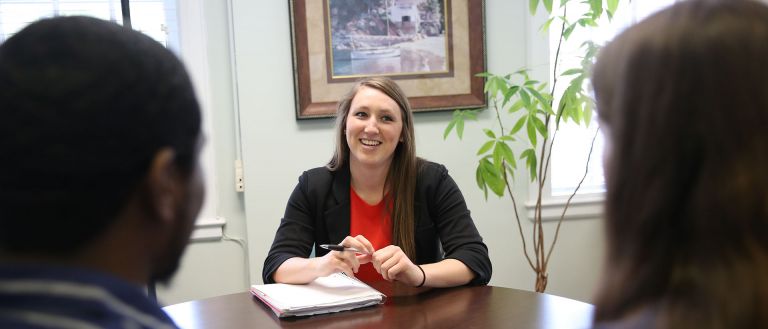
Defining the discipline
Financial therapy, the blending of financial and therapeutic skill sets and knowledge from multiple fields – financial planning, marriage and family therapy, financial counseling, psychology, etc. – is a relatively new discipline that got its start more than a decade ago, and FACS faculty members were instrumental in bringing it into the mainstream.
Financial therapy helps people achieve financial goals by addressing financial challenges as well as attending to emotional, behavioral and relational difficulties to improve overall well-being.
Faculty members Kristy Archuleta, John Grable and Joseph Goetz from the FACS department of financial planning, housing and consumer economics, and Jerry Gale from human development and family science, were all involved in the creation of the Financial Therapy Association in 2010.
“There were several people who had been working in this area for quite some time, but they didn’t really know each other,” Archuleta said. “We heard over and over again they felt alone – that wasn’t the case. They just didn’t know each other.”
Since the FTA was formalized, significant strides have been made in the developing field. Archuleta said a certificate program in financial therapy at the graduate level and at least a track of undergraduate courses is the immediate goal.
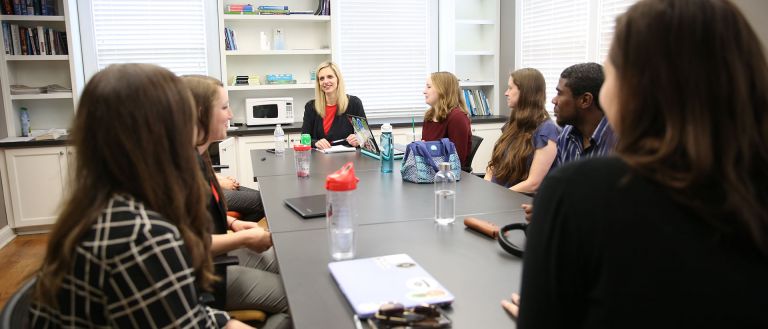
Experiential Learning
At UGA, the progress has been accelerated thanks to the ASPIRE Clinic, where students enjoy opportunities for interdisciplinary collaboration within a clinical setting.
It is here where financial planning students like Meghan Hogan first begin to realize the inextricable links between money and emotion.
“When you’re sitting with (financial counseling) clients and they start crying in meetings and you see how frustrated they get – I think early on I saw just how emotional money can be,” Hogan said. “You really see how important financial therapy is because it’s more than just planning for someone’s financial situation. It’s really about taking care of them as a person.”
Archuleta said the ASPIRE Clinic is an ideal model for integrating financial therapy into the curriculum because of the experiential learning opportunities and easy access to collaboration with student service providers from other disciplines.
“There is no other facility like this in the entire country that I’m aware of,” said Archuleta, praising the work of faculty members Lance Palmer, Goetz, Gale and clinic director Megan Ford. “The opportunities here for training students are incredible. It’s the ultimate human ecology model being played out in practice here.”
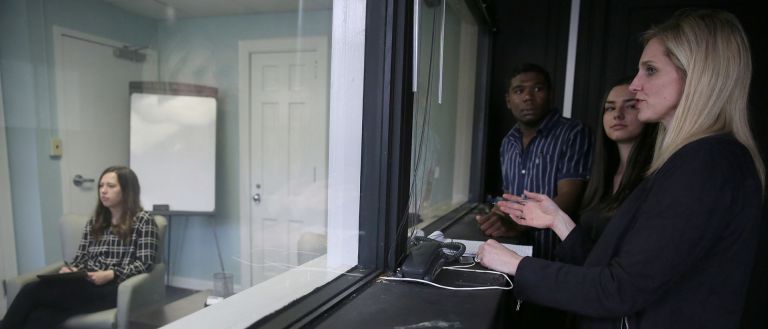
The future of financial planning
Taj Jones, a financial planning major who graduated in May, was one of the undergraduates who took Archuleta’s practicum course this year.
His previous internships in the financial services field involved working at a desk and interacting only with fellow office staff.
By contrast, his experience as a student service provider in the ASPIRE Clinic, coupled with Archuleta’s emphasis on financial therapy, has been “invaluable,” he said.
“I feel like financial therapy is the science behind financial planning,” Jones said. “You have to be able to respond to the clients’ questions, their demeanors, their needs and how to really interact with that person. One of the best things about the ASPIRE Clinic is it allows you to practice that.”
Jones said the experience gained from the practicum and his client sessions have even shaped his conversations with friends, making him more confident.
“I ask ‘Dr. Archuleta type’ questions now,” he said, laughing. “Like ‘How does that make you feel?’ or ‘Let’s explore that.’ The way I talk to people now, there’s more patience and just a better understanding of how people interact with each other.”
While a degree in financial therapy may be a few years off, Archuleta said the experiential learning component already in place through the ASPIRE Clinic gives graduates of the financial planning program a unique advantage.
“It puts them above everybody else in a resume pile because they’ve had actual experience interfacing with a client and they know how to communicate with somebody else,” Archuleta said. “They might not be meeting with clients right off the bat when they start, but it’s certainly putting them at an elevated level that employers definitely recognize.”
